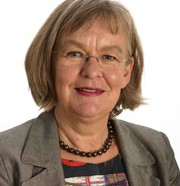The nuclear waste management in Sweden – Interview with Ms Lena Söderberg, Director General of SGU
Following up Finland recent pioneering project for building a deep storage of nuclear waste, how is Sweden current position on this topic and which are the implications for SGU?
Responsibility in Sweden for taking care of the nuclear waste from the Swedish nuclear plants lies with the Swedish Nuclear Fuel and Waste Management Co (SKB). Site investigations have been carried out at two different locations along the South-East coast of Sweden, at Forsmark, c. 120 km North of Stockholm, and at Oskarshamn, c. 230 km South of Stockholm, with the objective of siting an underground repository for spent nuclear fuel.
The current position in Sweden is that on the 16th of March 2011 SKB submitted a licence application to the Swedish Radiation Safety Authority (SSM) for the construction of a spent nuclear fuel repository at Forsmark and an encapsulation plant at Oskarshamn. The regulatory review of SKB’s licence application is ongoing, and the formal findings are planned to be submitted by SSM to the Swedish Government in 2017. The Swedish government takes the ultimate decision on whether or not to allow these final disposal facilities to be constructed, but not before the municipalities concerned have given their approval. A review is also undertaken by the Land and Environment Court based on the Environmental Code.
Expertise at SGU has been involved in the geological investigations of both sites and also the site descriptive geological modelling work, primarily concerning bedrock geology and unconsolidated deposits. The site descriptive modelling also included the geological, palaeoclimate and historical evolution, as well as future development of the landscape at both sites. However, it should be noted that geological expertise at SGU has not been involved in SKB´s site selection process, but only in the development of an understanding of the geological conditions at each site.
SGU is still involved in improving the geological model for unconsolidated deposits at the Forsmark site, but SGU currently has no planned future involvement with the storage facility if construction is approved.
Do you think that Nordic countries are paving the way at global level in nuclear waste management?
SKB and Posiva, the Finnish counterpart to SKB, have had a long-term partnership for more than 30 years concerning research and development of nuclear waste management in crystalline bedrock, and other countries have been interested in sharing this expertise. With this in mind, and that the construction of a final repository for nuclear waste, based on the KBS-3 concept developed by SKB, has been approved by the Finnish government, a general assessment is that Sweden and Finland are in the forefront what concerns nuclear waste management in crystalline bedrock.

